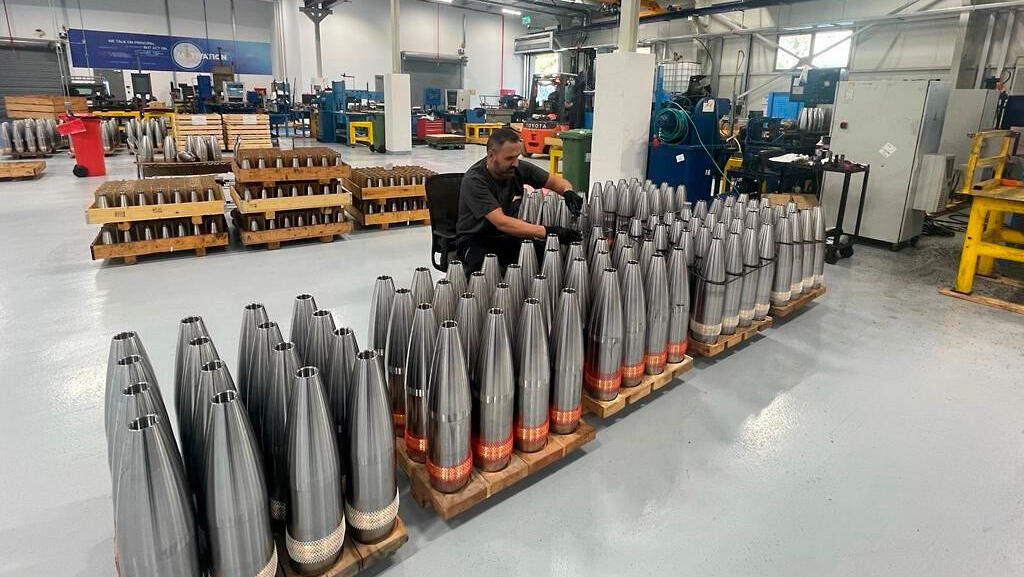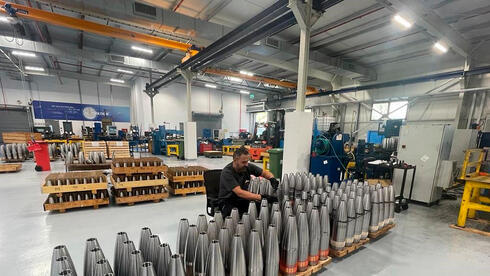
Israel to relax arms export rules amid surging global demand
New policies aim to boost defense sales amid increasing demand for modern combat systems, including those that have proven their effectiveness in the wars in Gaza and Lebanon.
The Ministry of Defense intends to ease restrictions on defense exports by Israeli arms companies to allow them to exploit opportunities for deals worldwide. This comes at a time of increasing demand for modern combat systems, including those that have proven their effectiveness in the wars in Gaza and Lebanon.
The move is being led by the Defense Export Controls Agency (DECA), focusing on reducing government restrictions on the marketing activities of defense companies in international markets.
The defense establishment has an interest in facilitating Israeli companies' defense exports in light of boycotts last year of their participation in arms exhibitions in France and Chile, in protest of the war in Gaza. Calls for an arms embargo on Israel are increasingly being heard around the world. At a DECA conference last week, Defense Ministry Director General Eyal Zamir said, “It is easy to isolate us, and we are forced to deal with embargo phenomena, overt and covert, including from those who were or are considered our best friends. We will continue to increase independent production.”
Despite increased production for the domestic market, Israeli companies generate most of their revenue from the international market. The defense establishment wants them to sell more in these markets, as their revenue allows, among other things, funding research and development programs for new combat systems needed for the IDF's security needs.
Unlike most countries in the world, Israel applies strict supervision to its defense exports. Every defense company must appear in the API exporters' registry, every defense product developed in the country is classified by it, and every marketing and export operation requires prior approval from it. The department's supervision policy is not transparent to the public, nor is the list of 110 “permitted countries” to which defense product exports are made with relative flexibility.
The defense establishment says that these are countries with stable regimes, that do not violate human rights, that do not have strong ties with countries hostile to Israel, and that the level of trust in their oversight bodies is high — which should reduce the risk of sensitive technologies being transferred to third parties. In recent years, the IDF has already eased the freedom of action for Israeli companies to carry out security transactions, while reducing bureaucracy and the requirement for specific licenses for every marketing activity.
Related articles:
Now, one of the main reliefs that the IDF plans to add concerns making it easier for Israeli companies to market weapons to countries that are not on the list of “permitted countries” — dozens of countries to which defense exports currently require a three-step process. In addition, representatives of defense companies participating in marketing events and international weapons exhibitions will be able to provide more information about most products. Currently, some of the information is conveyed only in censored videos or simulations. The reliefs also include extending the duration of the permit granted to defense companies to demonstrate a product to customers around the world from a period of 90 days to 180 days and providing maintenance and remote support services for the product that was supplied to the customer at the end. Until now, the law stipulated that an Israeli supplier of a weapons system to a foreign customer would provide maintenance services at the customer's premises or that the system be sent to Israel and serviced. Now, the IDF intends to enable these services through remote connection technologies.
According to the head of DECA, Racheli Chen, the planned moves are intended to improve the competitiveness of Israeli companies in global markets, given the growing demand for weapons systems. “While the plan is to ease the marketing procedures for systems, we are shifting most of our oversight towards granting export licenses.”
In addition to these easing measures, the Defense Ministry intends to repeal the “encryption order” in a way that should affect a group of Israeli companies, most of which are active in the high-tech industry. This is an archaic order signed in 1974 by then Defense Minister Shimon Peres at a time when the use of encryption was considered an issue that required close government-security oversight.
By virtue of this order, any company that engages in the development, production, import, export, operation, or possession of components that include encryption must obtain a special license from the Director General of the Ministry of Defense.
According to estimates, the scope of licenses granted under the outdated and unnecessary order, which is completely unenforceable today, is negligible, while those using encryption that require a permit from the Ministry of Defense are completely unaware of it and are in fact violating the law. According to Attorney Yuval Sasson, an expert in the field of defense exports at the Meitar & Co. firm, “The encryption order is not related to anything in the current era, and it would have been better if it had been repealed 30 years ago. Today, even an Israeli company that manufactures ice cream machines and undergoes due diligence at an American fund must explain why its exports are subject to licenses from the Israeli Ministry of Defense by virtue of the encryption order — it is completely unnecessary.”
The cancellation of the order is supposed to make it easier for companies that request special licensing, while shortening the time for export transactions that are sometimes delayed because of this, and saving on financial expenses associated with directing human resources to handle the issue. Unlike other reliefs in defense exports, which require approval by the Knesset's Foreign Affairs and Defense Committee, the cancellation of the encryption order requires approval only from the Minister of Defense.
According to Racheli Chen, the reliefs in supervision are derived from the dynamics that characterize the activity of markets around the world, and are characterized by fierce competition between arms companies that are attacking the huge budgets of countries that are arming themselves. Including the ongoing war between Russia and Ukraine, tensions in the South China Sea, wars in the Middle East, and the fear of a flare-up that will increase demand.
The ongoing war in Israel, and the extensive use that the IDF makes on various fronts of weapons produced by local defense industries, provides their products with operational validity in a way that upgrades their status in international competition. “We estimate that there will be high demand for Israeli weapons in the coming years, certainly for space and air defense systems, unmanned aerial vehicles, drones, and more, which have proven their performance during the war, and we will have to allow the industries to exhaust the opportunities to export them,” said Chen. She added that fixing the list of “permitted countries” facilitates the room for Israeli exporters to maneuver in a way that allows for a reduction in the number of marketing licenses. She added that the department aims to maintain this list so that exporters can exhaust their marketing efforts and not interrupt them due to changes in the inspection policy. “The list is based on the assessment that no dramatic changes are expected in these countries in the coming years and is supposed to serve as a business anchor for exporters. From time to time, we are forced to update it following cases of coups or blatant incidents of human rights violations.”
